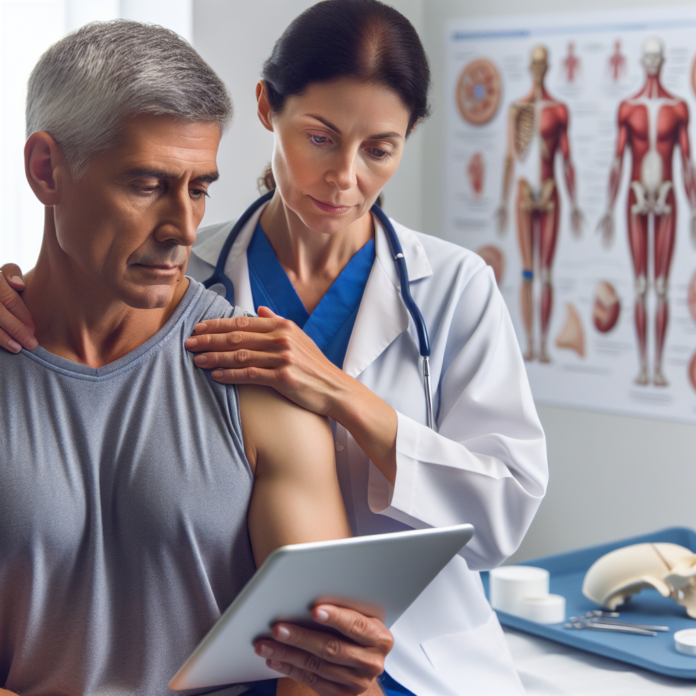After undergoing shoulder surgery, particularly a rotator cuff repair, it’s not uncommon for patients to experience a clicking or popping sound when moving their arm. Dr. David Guyer, a triple board-certified orthopedic surgeon and sports medicine specialist, delves into this phenomenon in his insightful video series. In this blog, we’ll explore what shoulder clicking might mean after surgery, whether it’s something to worry about, and the potential underlying causes. Drawing on Dr. Guyer’s expertise, we’ll also discuss how stiffness, muscle weakness, and healing processes could contribute to these auditory occurrences. Understanding what’s normal post-operation can alleviate concerns and set expectations for recovery. Join us as we break down these complexities with Dr. Guyer’s professional insights.
Understanding Post-Surgery Clicking
When you hear a clicking or popping sound in your shoulder after rotator cuff surgery, it can understandably raise questions and concerns about the recovery process. Is it an indication of healing, or should you be worried about potential complications? Let’s explore the various facets of post-surgery shoulder clicking and what they might mean for your healing journey.
Dr. David Guyer, an orthopedic surgeon with extensive experience, emphasizes that clicking and popping sounds in the shoulder are often not signs of serious concern. These sounds can occur due to several benign factors, especially following surgery where the dynamics and biomechanics of the shoulder have been altered. Here are some points to consider:
- Normal Recovery Process: After any major surgery, including rotator cuff repair, the body’s tissues are typically adjusting and recovering from trauma. This period of healing can involve inflammation, stiffness, and changes in muscle function, all of which may contribute to the sensation or sound of clicking.
- Inflammation and Swelling: The shoulder consists of various structures like tendons, ligaments, bursae, and cartilage. Post-surgery, inflammation in these areas is quite common, and as it subsides, it might cause the structures to move differently, resulting in clicking sounds. The bursa, in particular, can become inflamed, leading to thickening that might cause noticeable pops during shoulder movement.
- Muscle Weakness: Post-operative muscle weakness is a natural consequence of the recovery phase. The muscles surrounding the shoulder might not function optimally, leading to temporary imbalances or awkward movements that can produce sounds. Strengthening exercises as prescribed by your physical therapist will gradually restore muscle function and help reduce these sounds.
When to Be Concerned
While clicking and popping are generally not alarming, there are certain circumstances where you should seek medical advice:
- Persistent Pain: If the clicking is accompanied by significant or worsening pain, it could indicate that something more than normal post-surgery healing is happening. Pain should progressively decrease; if not, a consultation with your surgeon is warranted.
- Limited Range of Motion: If your shoulder’s range of motion does not improve or worsens significantly over time, this could be a concern. It might suggest the presence of adhesive capsulitis (frozen shoulder) or issues related to the healing of the tendon repairs.
- Long-term Symptoms: If several months into your rehabilitation, the clicking persists along with functional limitations, it may be time to revisit your orthopedic surgeon to ensure nothing else is amiss.
The Role of Rehabilitation
Rehabilitation plays a crucial role in the recovery process, addressing many of the factors that contribute to clicking. Physiotherapy exercises tailored to your specific condition can enhance:
- Flexibility and Stiffness Reduction: Improving flexibility can help reduce stiffness, allowing smoother movements that might minimize clicking.
- Strengthening of Shoulder Muscles: Strengthening exercises help in stabilizing the shoulder, ensuring that the muscles support the joint properly and reducing mechanical popping sounds.
- Proprioception and Coordination: Restoring proper movement patterns and coordination can reduce abnormal movements that often lead to audible clicks or pops.
The Psychological Aspect of Recovery
Hearing unfamiliar sounds like clicking post-surgery can be distressing. However, understanding that it is often a normal part of the recovery process can promote peace of mind. Dr. Guyer’s insights suggest that staying informed and maintaining open communication with your healthcare team are key. Engage in regular discussions about your symptoms and progress during follow-up appointments.
In Summary
Shoulder clicking post-rotator cuff surgery is usually not a sign of failure or complication. It can be part of the body’s natural healing process, as tissues settle and adapt to new conditions created by the surgical intervention. Nonetheless, if you suspect something beyond the ordinary, don’t hesitate to consult your orthopedic surgeon.
By following a structured rehabilitation program and monitoring your symptoms, you can significantly enhance your recovery experience. Remember, patience and adherence to your therapy plan are vital in regaining full shoulder function, minimizing concerns about shoulder clicking, and ensuring a smooth return to daily activities.
Wondering about clicking sounds after shoulder surgery? Orthopedic expert Dr. Guyer explains why it’s often normal and when to seek further advice.
